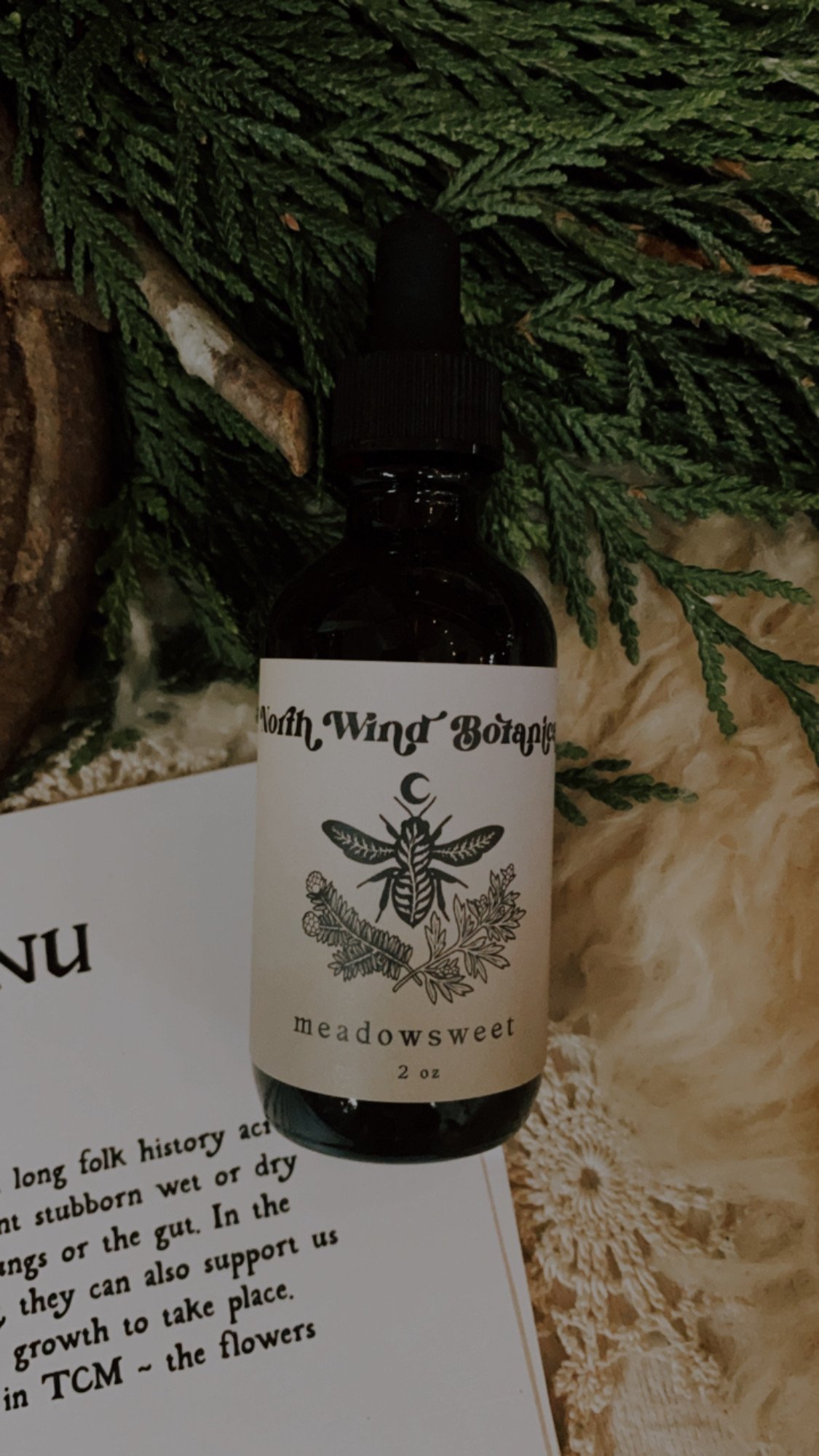Meadowsweet
Queen of The Meadow
Ingredients: Filipendula ulmaria (Meadowsweet)* fresh flowers and leaves, organic cane alcohol.
*organically grown // ^wild harvested
2 oz
Meadowsweet // fresh flowers & leaves 1:2
Dosage: For chronic inflammation take 1-2 dropperfuls (2ml) 2-3 times per day by mouth or in a splash of water. For acute condition, take small doses until pain/inflammation subsides.
Meadowsweet is cooling, astringent, and aromatic, and thrives in damp meadows, fens, and riversides. They are native to the British Isles and Western Europe but have since been naturalized on Turtle Island. Meadowsweet was one of the three sacred herbs used by the Druid’s, and was favored for brewing mead.
Medicinally, meadowsweet supports our bodies response to inflammation and is well known for their relieving pain compound salicylic acid.
It was through meadowsweet that Aspirin was created back in 1897. It is important to note that plant salicylates are not the same as aspirin, nor do they work on the body in the same ways. Aspirin can be irritating and damaging to the gut lining, and over consumption can result in stomach ulcers, burning, and internal bleeding. Even a single dose of NSAIDS can cause intestinal damage. Inflammation is necessary to the healing process, and when this natural response is “turned off” as pharmaceuticals do, there is collateral damage to the gut lining.
Plant salicylates work differently, and when consumed in a whole form, do not damage but actually heal the problems which aspirin creates. Where aspirin burns, meadowsweet soothes and cools.
Meadowsweet is indicated for the individual with heat and inflammation in the gut or urinary tract. They are a wonderful ally for gut healing along with calendula and plantain. They soothe heartburn and acidity. Meadowsweet provides headache relief, joint and pain relief, and can be taken as one would aspirin.
Dosage : 1-3 mL up to 4 times per day.
Precaution: Meadowsweet may cause allergic hypersensitivity in persons sensitive to salicylates or Aspirin
Queen of The Meadow
Ingredients: Filipendula ulmaria (Meadowsweet)* fresh flowers and leaves, organic cane alcohol.
*organically grown // ^wild harvested
2 oz
Meadowsweet // fresh flowers & leaves 1:2
Dosage: For chronic inflammation take 1-2 dropperfuls (2ml) 2-3 times per day by mouth or in a splash of water. For acute condition, take small doses until pain/inflammation subsides.
Meadowsweet is cooling, astringent, and aromatic, and thrives in damp meadows, fens, and riversides. They are native to the British Isles and Western Europe but have since been naturalized on Turtle Island. Meadowsweet was one of the three sacred herbs used by the Druid’s, and was favored for brewing mead.
Medicinally, meadowsweet supports our bodies response to inflammation and is well known for their relieving pain compound salicylic acid.
It was through meadowsweet that Aspirin was created back in 1897. It is important to note that plant salicylates are not the same as aspirin, nor do they work on the body in the same ways. Aspirin can be irritating and damaging to the gut lining, and over consumption can result in stomach ulcers, burning, and internal bleeding. Even a single dose of NSAIDS can cause intestinal damage. Inflammation is necessary to the healing process, and when this natural response is “turned off” as pharmaceuticals do, there is collateral damage to the gut lining.
Plant salicylates work differently, and when consumed in a whole form, do not damage but actually heal the problems which aspirin creates. Where aspirin burns, meadowsweet soothes and cools.
Meadowsweet is indicated for the individual with heat and inflammation in the gut or urinary tract. They are a wonderful ally for gut healing along with calendula and plantain. They soothe heartburn and acidity. Meadowsweet provides headache relief, joint and pain relief, and can be taken as one would aspirin.
Dosage : 1-3 mL up to 4 times per day.
Precaution: Meadowsweet may cause allergic hypersensitivity in persons sensitive to salicylates or Aspirin
Queen of The Meadow
Ingredients: Filipendula ulmaria (Meadowsweet)* fresh flowers and leaves, organic cane alcohol.
*organically grown // ^wild harvested
2 oz
Meadowsweet // fresh flowers & leaves 1:2
Dosage: For chronic inflammation take 1-2 dropperfuls (2ml) 2-3 times per day by mouth or in a splash of water. For acute condition, take small doses until pain/inflammation subsides.
Meadowsweet is cooling, astringent, and aromatic, and thrives in damp meadows, fens, and riversides. They are native to the British Isles and Western Europe but have since been naturalized on Turtle Island. Meadowsweet was one of the three sacred herbs used by the Druid’s, and was favored for brewing mead.
Medicinally, meadowsweet supports our bodies response to inflammation and is well known for their relieving pain compound salicylic acid.
It was through meadowsweet that Aspirin was created back in 1897. It is important to note that plant salicylates are not the same as aspirin, nor do they work on the body in the same ways. Aspirin can be irritating and damaging to the gut lining, and over consumption can result in stomach ulcers, burning, and internal bleeding. Even a single dose of NSAIDS can cause intestinal damage. Inflammation is necessary to the healing process, and when this natural response is “turned off” as pharmaceuticals do, there is collateral damage to the gut lining.
Plant salicylates work differently, and when consumed in a whole form, do not damage but actually heal the problems which aspirin creates. Where aspirin burns, meadowsweet soothes and cools.
Meadowsweet is indicated for the individual with heat and inflammation in the gut or urinary tract. They are a wonderful ally for gut healing along with calendula and plantain. They soothe heartburn and acidity. Meadowsweet provides headache relief, joint and pain relief, and can be taken as one would aspirin.
Dosage : 1-3 mL up to 4 times per day.
Precaution: Meadowsweet may cause allergic hypersensitivity in persons sensitive to salicylates or Aspirin

